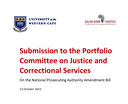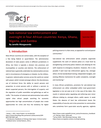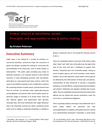Gauteng Premier Panyaza Lesufi’s Crime Prevention Wardens still have no policing powers, and if such powers were to be conferred by the minister of justice and commissioner, this would probably be unconstitutional.
ACJR Publications
A process has finally commenced within SAPS, which, it is hoped, will see places like Nyanga get at least an average share of policing — rather than a lower share.

This presentation was made at a webinar on Sub-national governance and the plight of people working in public spaces on 14 November 2023

This oral submission was made at the Portfolio Committee on Justice and Correctional Services held public hearings on the National Prosecuting Authority (NPA) Amendment Bill on 25 October 2023
Opinion-editorial by Lukas Muntingh in News24, 23 October 2023 Available HERE

Sub-national law enforcement (when properly organised) supplements the work of national police at a local level by strengthening community-police relations and allowing for the swift response to emergency situations. However, this is only possible if each local law enforcement agency has, amongst others, formal standardised training, independent budgets, and existing effective mechanisms for public complaints, oversight and monitoring. This Fact Sheet provides a situational analysis of sub-national law enforcement in two west African countries, one east African and one southern African country; namely, Ghana, Kenya, Nigeria, and Zambia and highlights some of the challenges present in each context, particularly with regards to enforcement targeted at those working within public spaces.

Public space forms the setting for a number of activities, including the setting for community life and livelihoods of the urban poor, such as street vendors or waste-pickers. There is growing evidence pointing to the problematic way in which public space is governed. In many developing countries, laws and policies, particularly at a local government level, tend to restrict the ability of people to earn a livelihood or perform life-sustaining activities in public spaces. Contravention of local ordinances or by-laws is frequently treated as a criminal offence, compromising informal dwellers and workers’ livelihoods, denying due process protections and often violating their human rights. In this factsheet, we contextualise how laws and policies result in the criminalisation of the poor and consider principles that are fundamental to good policy-making.
![[Report] An assessment of the National Preventive Mechanism (NPM) in South Africa [Report] An assessment of the National Preventive Mechanism (NPM) in South Africa](https://admin.dullahomarinstitute.org.za/acjr/acjr-publications/original-npm-report-2022.pdf/@@images/b268f992-baad-48f1-b946-4c399f9eec83.png)
After signing the Optional Protocol to UNCAT (OPCAT) in 2006 and ratifying it in March 2019, South Africa designated a National Preventive Mechanism (NPM), with the SA Human Rights Commission (SAHRC) being the coordinating structure. Since ratification in March 2019, it appears that to date, the NPM has not been fully functional and institutional arrangements for visiting places of detention under the banner of the NPM remain unclear. There is also uncertainty as to how the constituent parts of the NPM will fulfil the responsibilities under OPCAT. In view of the above, the members of the Detention Justice Forum (DJF) agreed to assess the operational functionality of the NPM in the respective sectors of the DJF member organisations. This also provided an opportunity to identify issues for clarification on the NPM’s mandate and its relations with other components as well as government departments responsible for places where people are or may be deprived of their liberty. This report provides the findings of the assessment performed amongst members of the Detention Justice Forum (DJF) based off a questionnaire that was developed. This report was prepared by K Petersen & J Mangwanda, December 2022

This presentation was made at a webinar on Sub-national Government and the Criminalisation of Poverty & Status: Defining the problem, 4 April 2023

This presentation was made at a webinar on Sub-national Government and the Criminalisation of Poverty & Status: Defining the problem, 4 April 2023

This presentation was made at a webinar on Sub-national Government and the Criminalisation of Poverty & Status: Defining the problem, 4 April 2023

This report provides an analysis of a survey of Magistrates' perceptions of prosecutors conducted in 2022. Prepared by Michael O’Donovan with Jean Redpath

This presentation was made at a webinar on Magistrates’ Perceptions of Prosecutors: Survey Analysis, 22 February 2023
Having a cabinet member with an exclusive focus on the police has had at least four immediate adverse consequences, argues Lukas Muntingh. He asks if it is time for an evaluation of this role.
A decline in disciplinary actions does not mean that the police are more disciplined than before
